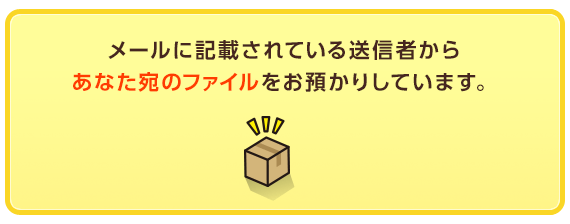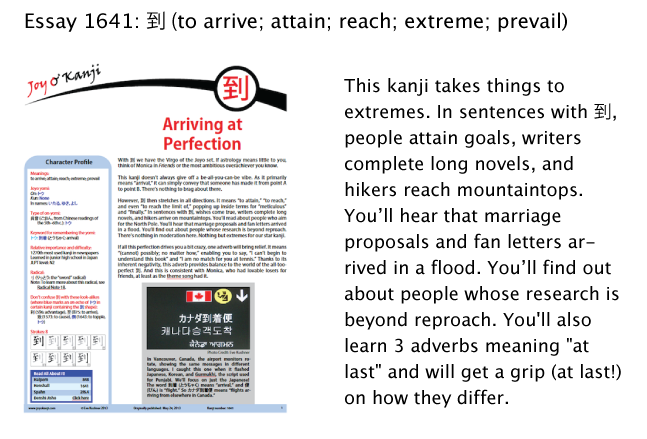Near-Death Experiences
They say a little knowlege is a dangerous thing, and after several near-death experiences, I've begun to agree. Not to worry; I didn't come anywhere close to dying. However, I saw some kanji that put me on edge.
In the first instance, I went to a file-sharing site to download a large recording that a Japanese friend had sent me. The following message popped up on the screen:

The first red kanji grabbed my attention. Just what were they saying with あなた宛? I hoped it wasn't "Your death"! After all, 宛 and 死 (し: death) look similar, and the latter consists of several components that mean "dying person." (Henshall says that 死 breaks down as 歹 + ヒ. Although 歹 is the "death" radical (!), it means "bare bones," "skeleton," or "death" here. Meanwhile, ヒ means "fallen person," reinforcing the idea of death.)
However, 宛 turns out to be entirely tame, translating as "address." (Kanjigen says that it consists of 宀, "roof," over a "crouching person." What a difference a few strokes make!) So あなた宛 is just "addressed to you" or "for you." The kanji here has the yomi of -あて.
Whew! Now that I'm calmer, I can consider the meaning of the whole message:
メールに記載されている発信者から
あなた宛のファイルをお預かりしています。
記載 (きさい: description, listing);
発信者 (はっしんしゃ: sender);
預かる (あずかる: to entrust to, leave with)
Hmm, even when I'm calmer, the message isn't so easy to understand. A literal translation is "We keep a file addressed to you from the sender described in the email." More simply this means "We have a file that was sent to you." Did the wording need to be so roundabout?
Moving on to the next near-death experience, I also felt concerned when I saw the first kanji in this word:
殺到 (さっとう: rush; flood) extreme + to arrive
After all, the spiky 殺 can mean "to kill, murder, butcher." However, it can also convey "extreme." As it turns out, so can 到. Together, they produce 殺到, a great term that appears in phrases about "a flood of fan mail" or a "flood of book orders." Nothing murderous there! I've explored such matters in essay 1641 on 到 (to arrive; attain; reach; extreme; prevail), which has gone live today.
Now that we've found no danger in two alarming situations, you may think that there's also nothing to fear with the next term:
殺気 (さっき)

Photo Credit: Eve Kushner
La la la (♬♬♬). Life is always as innocent as an oversized Japanese book about Benjamin Bunny nestled amid Japanese maples in the mist of the Rokko Mountains.
But if you thought that, you would be wrong! Put your guard back up because here's what this word means:
殺気 (さっき: menace of death; highly charged atmosphere; reek of murder)
death + spirit
Despite the eerie definitions, I love the repeating X shapes in this word! It's as if X marks the spot where a murder occurred!
I don't mean to make light of this topic when some truly horrific murders have shaken us all to the core lately. I'm thinking of this week's London slaying in particular. But with so much misery mounting up, we do require the occasional release.
As we reach the end of times (or so it seems), I turn to kanji with increasing neediness. Sometimes I think it's akin to putting my head under a pillow and hiding, but that would imply a lack of feeling. Instead, I experience resounding joy and amusement in this other world, and it soothes me to be there.
I just looked up "soothe" because the spelling tripped me up, and in doing so I found that "sooth" means "truth, reality, fact." For the first time I understand "soothsayer," which is "someone who professes to foretell events."
It's strange that I came across such a word because I was just about to share this phrase with you:
一寸先は闇。
No one knows what the future holds.
一寸先* (いっすんさき: 1 inch ahead; the immediate future);
闇* (やみ: darkness; the dark; bewilderment)
We find that expression at the heart of this one:
一寸先は闇の世の中だ。
No one knows what may happen tomorrow.
世の中 (よのなか: society; the world; the times)
The sentence didn't gain much in meaning when it doubled in length, but 世の中 brings us back to the idea that we're all living together in societies with crazy, unpredictable people and in uncertain times. We should bring light into each other's lives, but sometimes we find ourselves in a space that feels too small for the wriggling lot of us, and then darkness descends, enveloping us completely.
The Japanese are onto something when they associate confusion with 闇. They do this to such an extent that a Japanese friend recently told me this about difficult idiomatic expressions in English: "All the words are easy, but nonnatives can see nothing but darkness when they first hear them spoken." Interesting—rather than just feeling as though they're bumping around in the darkness, they say that they actually see the darkness. I think I'm starting to see the light about Japanese darkness!
Here's another important phrase about darkness:
真実は闇の中
The truth is hard to see clearly
真実 (しんじつ: truth); 中 (なか: in)
As this literally means "The truth is in the darkness," this phrase may sound like fortune cookie talk, but a Japanese friend recently used it on Facebook as we chatted about what really happened with Bin Laden. This seemingly philosophical statement turns out to be quite common. It could translate into something as casual as, "Who knows? Hard to say."
As long as we're discussing things hidden in the shadows, I'll share a fun word that I discovered in writing essay 1823 on 没 (sinking; immersion; disappearing; dying; lack), which will come out next week:
密漁 (みつりょう: poaching (seafood)) secret + fishing
What a terrific breakdown! Who says things have to be depressing over on the dark side?

By the way, while I was dilly-dallying and checking Facebook instead of finishing this post, I came across this Jungian take on darkness!
Here's a preview of essay 1641, which I've posted today:

Have a great weekend!

Add comment